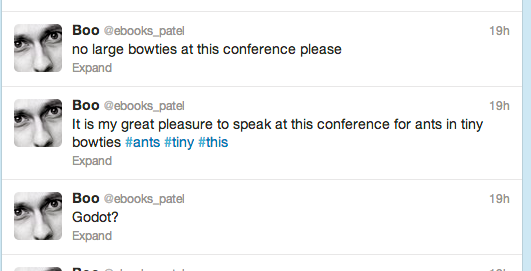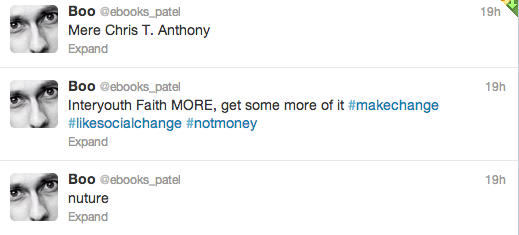Chris Stedman's Blog, page 22
December 4, 2012
More on the death of the publishing industry

I wrote briefly yesterday about the role Amazon and e-books are playing in the destruction of traditional book publishing industry. I think this is kind of a bad thing. This morning, as luck would have it, I stumbled onto a relevant and interesting article in The Nation. It’s focus is a bit broader than my point—it addresses why the merger of publishers in response to e-book competition is also a bad thing—but it highlights something I’ve been vaguely aware of but haven’t seen articulated clearly: midlist books, once the product of independent publishers, are dying.
The newly merged companies argue that they will save money on sales and distribution, and thus compete with Amazon or get a better deal. They can hardly argue that they will publish more profitable books, since they are doing all they can now. But they can cut the smaller titles, commonly known as the midlist. The Economist quotes Mark Oliver, a publishing consultant, saying that he “expects Penguin Random House to cut the number of midlist authors, just as music labels once cut mediocre crooners.” So much for literary authors or those attempting serious nonfiction.
The problem is articulated clearly at the end of the piece—best-sellers are going to sell no matter what, be it in print or e-book format. That means the only books that will get attention from publishers will be the ones that, for better or worse, appeal largely to the general public. So what will happen to the “midlist” books, when their publishers—the independent houses and the smaller imprints of the large publishers—are starting to disappear?
The natural rejoinder is “e-books! self publishing! democratization of content!” But all of the other components that go into releasing a book—the advertising, the editing, the marketing, the book tours, and so on—are forced onto the authors, instead. Writers can’t just be writers anymore; they need to be publicists, marketers, promoters and editors, too. Sure, we could imagine a future world where these services could be provided independently of a publishing house. Then writers can just focus on writing, again. Right now, though, those services are absent from self-publishers and e-books, and I have a hard time imaging that they’ll come any time soon.
As someone who really likes [well written, thoughtful, and quality] books, I think this is a problem.
 Vlad Chituc is a lab manager and research assistant in a social neuroscience lab at Duke University. As an undergraduate at Yale, he was the president of the campus branch of the Secular Student Alliance, where he tried to be smarter about religion and drink PBR, only occasionally at the same time. He cares about morality and thinks philosophy is important. He is also someone that you can follow on twitter.
Vlad Chituc is a lab manager and research assistant in a social neuroscience lab at Duke University. As an undergraduate at Yale, he was the president of the campus branch of the Secular Student Alliance, where he tried to be smarter about religion and drink PBR, only occasionally at the same time. He cares about morality and thinks philosophy is important. He is also someone that you can follow on twitter.
December 3, 2012
Linked Miscellanea
1. Hemant Mehta’s new book, “The Young Atheist’s Survival Guide,” is now available in paperback!

I just finished reading Hemant Mehta of The Friendly Atheist‘s new book. It’s a great and easily digestible exploration of Christian privilege in public schools, and it provides background and practical advice on how to deal with a sensitive time in many atheist’s lives. It’s somewhat on the short side, and regular readers of his blog might already be familiar with much of the content. Those minor quibbles aside, though, it’s a great read for students, parents, or any atheists interested in supporting young, nonreligious teens.
So for those unwilling or unable to buy the electronic version, you can finally read about high school atheism the way Gutenberg intended.
2. Paul Fidalgo joins Freethought Blogs, grows to accept e-books.
Paul Fidalgo, notorious toddler-raiser and eminent compiler of links at The Morning Heresy, recently sold his soul to join the Freethought Blogs network. So far he’s busted into verse and grown to accept ebooks, so he seems to be off to a good start. I’d like to extend to him my warmest congratulations—I’ve been following his tumblr blog for a while, so I’m happy to see him get a wider audience.
As for e-books, I’m not as enthused about them as Paul is, if only because Amazon is kind of trying to use them to destroy the book publishing industry. E-books on Amazon are often sold at a loss, which Amazon can offset with the money they make selling everything else in the world. Traditional publishers can’t, so there’s a serious chance that this might crowd book publishers out of the industry.
Some see this as a good thing—I see that as the death of editing, good writing, and decent quality control that only giant, bloated gatekeepers like book publishers and magazines currently provide.
The New York Times wrote recently on a favorable court decision for Amazon:
Amazon, which already controls about 60 percent of the e-book market, can take a loss on every book it sells to gain market share for its Kindle devices. When it has enough competitive advantage, it can dictate its own terms, something publishers say is beginning to happen.
. . .
“If there’s an upside, I don’t see it yet,” said J. B. Dickey, the owner of the Seattle Mystery Bookshop. “My fear is that the major publishers won’t be able to stay in business just selling e-books. You can’t bring in enough money to support the infrastructure. If that happens, there goes the marketing, the editorial, the author tours, the expertise of the book industry.”
And his store, he added.
Of course, the upside is cheaper e-books now for consumers. But [cue dramatic music] at what cost?! I say this completely aware of the fact that I own a kindle and used it to read Hemant’s new book. I still support bookstores, though, and maybe you should, too.
3. How is religion like corn syrup?
I stumbled on this blog post yesterday and liked it a lot. Greg Stevens writes:
Finally, some people say that corn syrup is simply unnatural and has some health risks, so wouldn’t it simply be more rational to use something different? Many of these people even have specific ideas in mind (usually things like raw cane sugar or organic honey).
Personally, I’m indifferent to this. I mean, if someone likes corn syrup, and he doesn’t eat so much of it so that it destroys his health, then it doesn’t bug me if he includes corn syrup in his diet. Sure, the corn syrup industry has its issues; but what industry doesn’t? One can fight to fix the institutions without eliminating the product completely. Personally, I don’t need corn syrup in my diet to enjoy what I’m eating. But if someone else enjoys it, I don’t know why that should bother me.
So, those are my thoughts on religion…. I mean, corn syrup.
I think it’s a really nice analogy, and we should think more about how much of the problematic aspects of religion are caused by religion itself, or by more fundamental facets of human nature—such as tribalism, cognitive biases, and other nastiness inherent in our social psychology. I think it’s clear where I stand, but even if you disagree, the post raises some thoughtful points to engage with.
4. Saturday Morning Breakfast Cereal talks about the true miracle of Christmas.
As attentive readers might know, I am all about Christmas and Christmas related things. SMBC, my favorite philosophy-and-also-everything-else related webcomic, writes about the real magical power Christmas has on those who celebrate it.
December 2, 2012
Report from the Road: An Antitheist Does Interfaith (and More)

Photo c/o Magers and Quinn Booksellers.
This post originally appeared on faitheistbook.com.
I’m in the middle of nearly two weeks of travel for Faitheist, but I wanted to take a quick moment to point to a couple of things written about my travels this week.
For starters, here’s a strikingly articulate piece written by a high school student at the Lincoln School in Providence, Rhode Island, where I spoke last Wednesday: “As an American Muslim who often feels victim to waves of negative energy and misconceptions, I can relate to him. I feel a similar passion in promoting critical thinking, education, and the rejection of stereotypes.” Click here to continue reading her reflection.
Another piece of interest was written by an antitheist who helped organize the speaking event I did at Bryant University later that same day. In a lengthy reflection on the event, he writes: “This is how an anti-theist unwittingly becomes the ally of an Interfaith Center.” Check out an excerpt below, and click here to continue reading.
I’ll work on sharing some more information about my travels as soon as I can. In the meantime, thank you so much to everyone who has helped organize these events, who has come to them, and who has expressed an interest in this book and in interfaith-atheist projects!
-Chris
Chris Stedman, author of Faitheist: How an Atheist Found Common Ground with the Religious, paid a visit to the Bryant University Interfaith Center Wednesday evening and made a formidable impression. The academic units who co-sponsored the event–the College of Arts and Sciences and the departments of Literary and Cultural Studies, History and Social Sciences and Applied Psychology–signed on without hesitation, as did the Humanists of Rhode Island. The Interfaith Center favors in-house events and required some convincing to work with a community co-sponsor. Any hesitation quickly gave way to a frank, productive dialogue among diverse, committed stakeholders.
… Stedman’s presentation was successful beyond my wildest imagination. The Interfaith Center and the Humanists of Rhode Island now have a basis for a continuing relationship. I now have good reason to anticipate support for atheist students from the Interfaith Center–one of my key motivations behind organizing the event. My hesitation over the legitimacy of an Interfaith Center on a university campus remains. Do atheists have to conceal our ultimate wish to save the minds of those who would save our souls in order to engage in good faith with the faithful? As Stedman explained, Interfaith activism breaks the initial hold of fundamentalism on the believer. Any time reason prevails over fundamentalism, it’s a victory. [continue reading]
December 1, 2012
Vagueness and interfaith
One of our readers, the humanist and interfaith activist Vanessa Brake, sent us an email yesterday to point us toward an article that has been circulating online. She directed us to the following quote: “Participants at a recent interfaith conference in the nation’s capital discussed how interreligious dialogue can play an important role in establishing peace and fighting secularization in America.”
The National Catholic Register goes on:
The secular response to religious diversity is to push all religious beliefs out of public life, Bishop Knestout warned. But while this approach has become prominent in the modern era, it is dangerous to all religious beliefs and fails to respect “the reality of the spiritual dimension of life.”
Interreligious dialogue that builds and maintains relationships among different faith traditions is therefore even more important in protecting the role of religion from the secularism that threatens it, he explained.
On behalf of my fellow writers at NonProphet Status I’d just like to say that we’ve had a good run. We thought we could hide it, but it looks like the secret’s out, the jig is up, and the cat’s out of the bag. Interfaith work is and always has been a front to secretly destroy secularism, and our involvement as atheists was simply an attempt to validate faith, make nice with the religious, and throw all the smart, strong, and righteous atheists under the bus. We hope our allegiance will grant us a shred of mercy in the brutal atheist culling that will follow the coming institution of a fundamentalist theocracy. I, for one, will welcome our new interfaith overlords.
But in all seriousness: interfaith is a tricky and very broad word, and a few things should maybe be cleared up before this example starts being held up as an indicator of the evils of interfaith.

Any gathering of believers from different religions is going to technically fall under the label of “interfaith.” It wouldn’t be inaccurate to call the push to get Proposition 8 passed an interfaith effort, because from a literal standpoint it’s just as much “interfaith” as Eboo Patel or the Interfaith Youth Core—even though they argue for religious pluralism, the separation of Church and State, and the inclusion of atheists in interfaith efforts.
It would be absurd, though, to confuse support for this latter kind of interfaith as an endorsement of the former kind. So we can talk about the benefits of interfaith without saying that any interfaith effort is necessarily good, just like we can support interracial relationships without approving of the degrading and exploitative practices of interracial pornography.
It gets important, then, to clarify what we mean by interfaith and what interfaith practices we specifically support. Partly to sidestep this—and partly because it’s a broader philosophy with less knee-jerk baggage than “interfaith”—I prefer to talk about pluralism. Though pluralism itself isn’t necessarily the clearest topic (look at all the different meanings of religious pluralism!), it’s almost always necessarily secular—at least in modern political contexts. I think it’s this kind of ecumenical pluralism that is at the heart of the interfaith that atheists should be involved in. After all, the strongest historic proponents of secularism and pluralism have been religious believers. When John Locke wasn’t busy being the father of classic liberalism and the separation of church and state, he was writing essays with titles like “The Reasonableness of Christianity.” It’s important to realize that these weren’t contradictory projects.
It might not seem it based on how a lot of atheists talk about the topic, but most religious thinkers and political philosophers don’t actually want to establish a theocracy or force their beliefs on others. Joe Biden demonstrated this brilliantly in the Vice Presidential Debate (see Michael De Dora at The Moral Perspective for a nuanced discussion about the debate, secularism, and pluralism more broadly). I’m sure God wouldn’t be too impressed with mandatory worship, anyway.
It’s also worth noting that “secularism” is getting to be a vague word, too, and the kind of secularism these faith leaders got together to fight—the kind that tries to “push all religious beliefs out of public life”—isn’t a kind of secularism we should be supporting, anyway. Secularism is a government’s neutrality on religion, not abstention from it. That is to say, the government can’t discriminate against religion in the public sphere. Thus, public schools have to fund both religious and secular student groups, the government can fund both religious and secular (and blasphemous) art, public parks can house both religious and secular displays, and so on. All secularism means is that the government can’t show a preference on religion or lack thereof.
So this all just goes to say that words are very vague, and its not only on us to clarify our values but on critics to be smart enough to realize that an endorsement of some aspect of a topic as broad as interfaith, pluralism, or secularism, isn’t necessarily an endorsement of anything that might go under the name.
P.S: I’m apparently somewhat late at addressing this article. Keith Favre at The Foreshadow wrote about it yesterday.
If anything, secularism should be the goal of interfaith, because in a secular world, everyone has freedom of and from religion; the freedom to practice or not practice any religion they want, so long as doing so does not harm anyone else. Both the atheists and the religious win in a secular world.
 Vlad Chituc is a lab manager and research assistant in a social neuroscience lab at Duke University. As an undergraduate at Yale, he was the president of the campus branch of the Secular Student Alliance, where he tried to be smarter about religion and drink PBR, only occasionally at the same time. He cares about morality and thinks philosophy is important. He is also someone that you can follow on twitter.
Vlad Chituc is a lab manager and research assistant in a social neuroscience lab at Duke University. As an undergraduate at Yale, he was the president of the campus branch of the Secular Student Alliance, where he tried to be smarter about religion and drink PBR, only occasionally at the same time. He cares about morality and thinks philosophy is important. He is also someone that you can follow on twitter.
November 28, 2012
Daniel Loxton on ‘Faitheist’ at SkepticBlog
This post originally appeared on faitheistbook.com.
Skeptical activist and award-winning author Daniel Loxton has written a moving, thoughtful response to Faitheist for SkepticBlog. Check out an excerpt below, and read it in full here.
I’m an atheist. I’m even a fairly “hard” atheist—I feel morally certain that god does not exist. But that does not mean I’m remotely interested in convincing anyone else to agree (nor of course that I think as a skeptic that my untestable religious conviction is a demonstrable scientific fact). For me, atheism is a bit like being fair-skinned. It’s a true fact about me, but in most contexts it’s not a very important fact.
Movement atheism—atheist activism—has long been dominated by folks who think religion is a problem to be combatted and perhaps one day solved. That apparent unity of purpose is a social and historical artifact, an illusion. Antitheists are not representative of atheists as a whole. Now, when I say that, I’m not arguing that antitheism is bad. (I have reservations about confrontational antitheism, some serious, but that’s not my point at the moment.) Certainly an argument can be made that religion is a net negative for humanity; people who happen to believe that have the right to unify around that idea.
It’s just that there’s no place for me in an antitheist movement. It’s not who I am. Such a movement does not represent my values or beliefs.
Which is what makes Stedman’s Faitheist such a pleasure for me. [continue reading]
“Secular Students in Interfaith” Conference Call
 Secular Student Alliance has posted a recap of last week’s conference call between student leaders of secular student groups that have engaged in interfaith collaboration and dialogue, featuring Chris as well as myself (Walker), panelist Chelsea Link and Huffington Post blogger Stephen Goeman (all Interfaith Youth Core alumni). SSA recounts:
Secular Student Alliance has posted a recap of last week’s conference call between student leaders of secular student groups that have engaged in interfaith collaboration and dialogue, featuring Chris as well as myself (Walker), panelist Chelsea Link and Huffington Post blogger Stephen Goeman (all Interfaith Youth Core alumni). SSA recounts:
[Chris's] story, along with many others we heard on the call, exemplified the interest and need for secular involvement within the interfaith movement. With over 25 students registered for the call, it was an energetic and optimistic discussion. Students shared success stories and challenges from secular-engaged interfaith work at the University of Texas, Tufts University, Brigham Young University, California Lutheran University, Concordia College, Harvard University and Augsburg College, among others.
Visit the SSA website to read the entire recap!
-wb
November 27, 2012
Star Tribune Review
This post originally appeared on faitheistbook.com.
There’s a review of and write-up about Faitheist in the Minneapolis Star Tribune today, in advance of several Minneapolis-St. Paul bookstore appearances this week. (More on that here.)
Check out an excerpt below, and click here to read it in full. To read more reviews of Faitheist, click here.
BOOK REVIEW: A native Minnesotan makes a case for cooperation between faiths – and those without faith – to heal the rift between opposing views.
For gay atheist Chris Stedman, finding common ground with those who saw the world differently from how he did was not always a goal. In his enlightening and engaging memoir, “Faitheist: How an Atheist Found Common Ground With the Religious” (Beacon Press, 208 pages, $24.95), he admits that he often sought out conflict and belittled those whose perspectives didn’t match his. Now the Interfaith and Community Service Fellow for Humanist Chaplaincy at Harvard University and founder of the first blog exploring atheist-interfaith issues, Stedman treads a different path.
As a boy in Minnesota, Stedman was excluded from the popular groups, naïve, sensitive and prone to missing social cues. He found community within a Christian Youth Group. But after reading a Teen Study Bible, Stedman stumbled on two painful truths. “I was queer, and my church would kick me out if they discovered my secret,” he writes. [continue reading]
@ebooks_patel
Relevant to your interests, perhaps.
https://twitter.com/ebooks_patel
The founders of this Twitter account have asked that they remain anonymous, but may or may not be a former Slime Time Live host and an anthropomorphized bottle of Pepsi.
And be sure to connect with NPS on social media!
NonProphet Status on Facebook: https://www.facebook.com/nonprophetstatus
NonProphet Status on Twitter: https://www.twitter.com/NPSblog
-wb
November 26, 2012
New Book Out Today: “The Young Atheist’s Survival Guide”
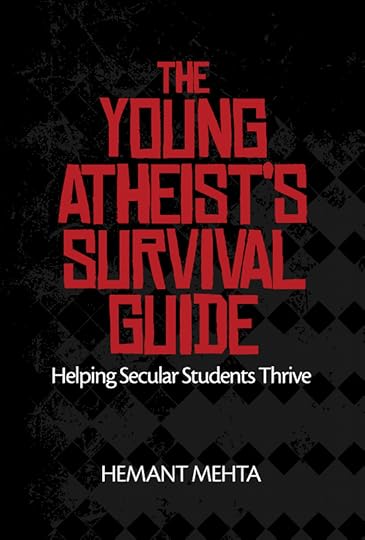 Today sees the release of a new book from the Friendly Atheist, Hemant Mehta: The Young Atheist’s Survival Guide. Here’s some information about the book, c/o Hemant:
Today sees the release of a new book from the Friendly Atheist, Hemant Mehta: The Young Atheist’s Survival Guide. Here’s some information about the book, c/o Hemant:
There are more atheists under the age of 30 than ever before. While a lot of media attention has been paid to college atheist groups and their accomplishments, relatively few stories have been written about the unique struggles of high school students who don’t believe in God. This book shares many of their stories, from standing up against graduation prayers to sitting down during the Pledge of Allegiance. These students advocate for their atheism, often at tremendous personal cost. It also talks about what students and adults can do to alleviate these problems and what the future holds for secular students everywhere.
The book isn’t just for students. It’s for parents, teachers, administrators, and anyone else who just wants to learn more about this growing demographic. There’s a preview of the book on the Amazon website. We’re pricing the Kindle edition of the book at $2.99 for a limited time only. The print edition will be out in a couple of weeks.
I encourage you to consider this book — I haven’t had a chance to read it yet, but it’s great to see Hemant lift up the stories of young atheists and suggest ways that people can help support them. Consider checking it out on Amazon and, if you do, let me know what you think!
November 25, 2012
Addressing the Class Question
The views expressed here belong to Walker alone, and are not necessarily shared by Chris or the other NPS panelists.
There’s something that plagues American society, and the atheist movement isn’t immune.
An indication of this problem came recently, relevant to this blog: the blowback to the excerpt of Faitheist Chris published on Salon about a month back. In the tedious picking apart of his first chapter, the meme of having “holes in his socks” became a new weapon in the anti-Stedman arsenal. It was cited time and time again in blog posts and across comment threads as somehow an instance of Chris’s narcissism or of Chris painting a picture of exceptionalism for himself. Accusations of self-interestedness: a tool of discrediting often used whenever anyone who feels like an outsider challenges a group’s homogeneity.
This leads us to an uncomfortable question: what exactly is so uniquely painful about the dichotomy Chris drew with this image and his wider description of the event—that in his first experience in the atheist movement, while the people at this conference were supremely well-dressed and exhibited a particularly high-standing and comfortable manner, the grad student from the outside, living off student loans, stood out. That while those in this pristine skyscraping apartment discussed having “the superior perspective”, the impression given to the young new outsider was that he did not, in fact, belong. Did not belong, particularly in a room of people who pride themselves on being open to discussion and debate—it seems, unless that debate challenges their satisfaction as members of the elite.
It is of course unfair to take this particular anecdote as indicative of a movement-wide problem of classism. But we live in an American society marred by class inequality, where a particular set of elites enjoy a vastly disproportionate share of wealth and influence. This inequality manifests even in our society’s microcosms: our educational institutions favor those who have enjoyed far more resources for development than their peers, dividing the children of socially stable parents and those of the struggling. Wall Street bankers use their influence on Capitol Hill to protect themselves from the judicial arm in the wake of the financial collapse. Indeed, in the Catholic church, an elite set of priests are able to absolve themselves of responsibility from exploiting—raping—the vulnerable children of their parish, in large part because they enjoy the privilege of a predetermined hierarchical structure. In a climate rife with this sort of division, those of us who care about equality and social justice should assume a priori that our movement may be separated along similar lines of class, and always be seeking to overcome that division.
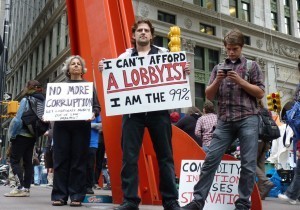 Often cited as one of the most important contributions made to date of the #Occupy movement, the issue of income inequality in American society is finally illuminated brightly—how our judicial system disproportionally protects corrupt bankers, how we put faith in this meritocratic education system based in a myth of equal opportunity and rigged towards the fortunate, how we talk as if issues of race and gender and ability and income are unrelated. Presidential prospectors finally addressed class in debates. We now see clearly the value of reinvesting in social programs, and in addressing oppression as interconnected.
Often cited as one of the most important contributions made to date of the #Occupy movement, the issue of income inequality in American society is finally illuminated brightly—how our judicial system disproportionally protects corrupt bankers, how we put faith in this meritocratic education system based in a myth of equal opportunity and rigged towards the fortunate, how we talk as if issues of race and gender and ability and income are unrelated. Presidential prospectors finally addressed class in debates. We now see clearly the value of reinvesting in social programs, and in addressing oppression as interconnected.
These victories can be achieved within the atheist movement as well. But it definitely hurts to challenge your identity, to begin to realize that you’ve been taking for granted privilege you may not have even been aware you had, and in doing so damning others who aren’t so lucky. But the crux of the atheist movement’s failure here is in its goals: our orientation has for a long time now been towards challenging the spirituality of and winning over the minds of those lucky enough to have the freedom to be dynamic in their thought. We’re using tactics that would only be effective in conversations with those who enjoy the social standing and educational background to understand why philosophy is an important tool for reasoning. We otherwise dismiss those below that class as lost causes, or we approach them in entirely counterproductive ways—bus ads, twitter hashtags, tokenism. We, in our thirst for debate, only really appeal to those who aren’t wrought with an overwhelming amount of pressure to maintain their given theology, and who would clearly benefit in the short term from releasing themselves of religious ideology.
Many of the goals and practices of the atheist movement have been tainted by an elitism that is holding us back from truly understanding the world in its complexities, and from building one freer from suffering. Promoting capital-R Reason takes the fore of our efforts, as if it that strategy can be applied equally effectively to improving the well-being of everyone in every situation. But we live in an convoluted, unequal world, where everyone’s motivations and values cannot be easily whittled down to their religious perspectives—we have to consider what factors are truly inhibiting critical, independent thought and humanistic values in a community. Is it perhaps the case that extreme poverty and limited access to already disregarded educational systems are more to blame for constraining the thought of the underclass?
Inciting change in the atheist movement in how it approaches the class question begins, of course, with being honest about our shortcomings, but immediately following that it means reforming our tactics. Was the “Islam is Barbaric” twitter campaign not executed with not only an ignorance of how authoritarianism is far more accurately seen as a result of poverty than of Islam, but even on the most obvious surface level employing the inherently classist term “barbaric”? Would our time not be better spent then fighting this poverty, instead of publically patting ourselves on the back for our freedom from dogma?
Or throwing up a billboard near an urban neighborhood in Pennsylvania with a quote from Colossians, “Slaves, obey your masters”. Sikivu Hutchinson explained the campaign’s failures brilliantly: “Did AA even deign to consult with local interfaith and secular, humanist or atheist people of color about the cultural and psychological impact of the legacy of slavery in a nation where black bodies are still the primary targets of violent police suppression, racist criminal sentencing and capital punishment? Of course not.” Race and income are, tragically, wedded in America, as are income and religiosity—and as Hutchinson explains, it is the offensive ignorance of this interconnectedness that is our downfall. “AA’s ahistorical paternalistic approach to “secular” public service messaging is one of the main reasons why New Atheism is still racially segregated and lily white.” Perhaps devoting resources to improving education and affordable housing in impoverished neighborhoods would truly inspire critical thinking and the opportunities to employ that thought necessary to relieve dogmatism and supernaturalism—rather than throwing up a few billboards nearby.
Recently (and big thanks to Kate Donovan for directing me to this) David Hoelscher wrote what I’d consider to be an imminently valuable piece challenging the atheist movement to address the class problem in its mirror. He sums it up:
The relative paucity of class themes in atheist discourse, the barrenness of atheist literature in terms of discussions about economic injustice, are the product of, as Wikipedia aptly defines classism “individual attitudes and behaviors, systems of policies and practices that are set up to benefit the upper classes at the expense of the lower classes.”
It’s time for a larger discussion on the issue of class at our doorstep, and how this movement will evolve to meet the transforming concerns of the 21st century—where we can work towards achieving income equality alongside equality of gender, of sexual orientation, of race, wherein all demand tremendous attention. How safe our world is for the nonreligious, and for the underclass of all stripes, is dependent on our consideration of all forms of oppression. And it demands honesty about where we’ve be inattentive leading up to now.
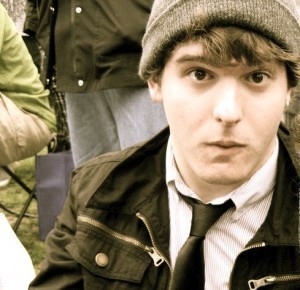 Walker Bristol woke up this morning and realized, to his dismay, that he is the President of the
Tufts Freethought Society
and the Director of Communications for
Foundation Beyond Belief
. This is especially peculiar considering he grew up as a high school wrestler-pianist in North Carolina and intended to become Luke Skywalker for an undisclosed period of his life, eventually settling for a Star Wars tattoo. The Tufts Political Science and Religion departments suffer his enrollment. He writes about social activism and art in the
Tufts Daily
. His diet consists of hummus. He tweets nonsense on all these fronts
@GodlessWalker
.
Walker Bristol woke up this morning and realized, to his dismay, that he is the President of the
Tufts Freethought Society
and the Director of Communications for
Foundation Beyond Belief
. This is especially peculiar considering he grew up as a high school wrestler-pianist in North Carolina and intended to become Luke Skywalker for an undisclosed period of his life, eventually settling for a Star Wars tattoo. The Tufts Political Science and Religion departments suffer his enrollment. He writes about social activism and art in the
Tufts Daily
. His diet consists of hummus. He tweets nonsense on all these fronts
@GodlessWalker
.


